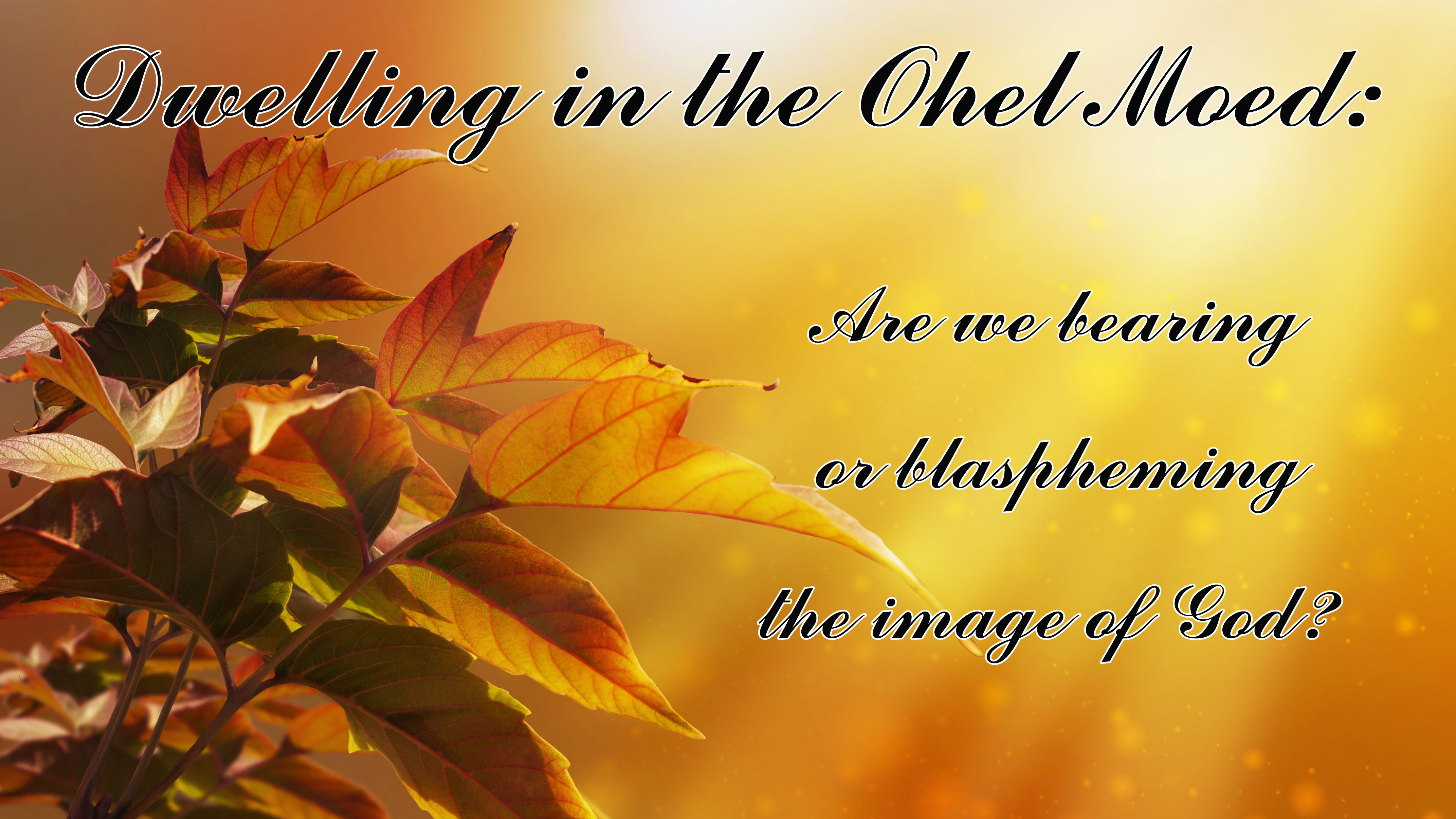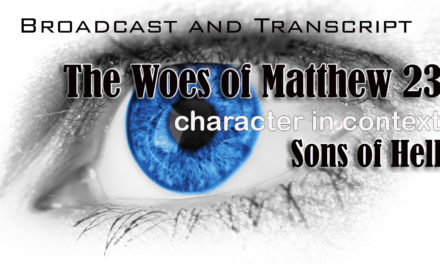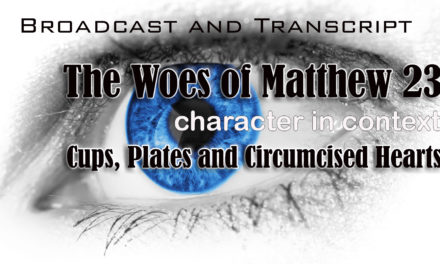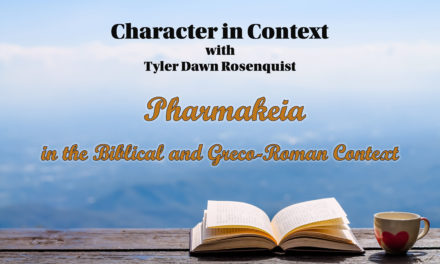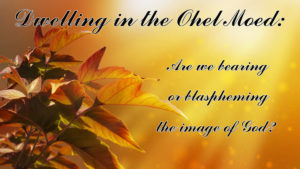 I have been spending much time meditating upon Psalm 15 – probably the most hard-hitting and challenging of the short Psalms as far as really laying out what it means to (or not to) represent God’s character. This Psalm delves not only into the Torah Laws concerning the pervasive theme of righteousness and justice, which is characterized by doing right to our neighbors in concrete ways and especially to the “least of these”, but also into Temple cosmology, the concept of the Tabernacle/Temple as being the place where Heaven and Earth meet.
I have been spending much time meditating upon Psalm 15 – probably the most hard-hitting and challenging of the short Psalms as far as really laying out what it means to (or not to) represent God’s character. This Psalm delves not only into the Torah Laws concerning the pervasive theme of righteousness and justice, which is characterized by doing right to our neighbors in concrete ways and especially to the “least of these”, but also into Temple cosmology, the concept of the Tabernacle/Temple as being the place where Heaven and Earth meet.
1 O LORD, who shall sojourn in your tent?
Who shall dwell on your holy hill?
Let’s look at this first verse – although one might be tempted to assume that the word for tent here is sukkah, it is actually ohel – a very important word in Tabernacle studies. The ohel moed was the tent that Moses first set up outside the camp of the Israelites while the actual Tabernacle was being built. After the incident with the golden calf in Exodus 32, God was not willing to dwell in the midst of the people because they had corrupted themselves. Starting in Exodus 25 and through 31, God had already given detailed instructions for the construction of a mobile Tabernacle as His dwelling place as well as instructions detailing how the Priests and Levites would minister on God’s and the people’s behalf and care for the portable shrine. Building the Tabernacle, however, was not an overnight job and the Israelites had seriously defiled themselves through idolatry. So Moses set up a tent outside the camp and would go inside whenever he needed to talk face to face with God. This ohel, then, became the meeting place, the place where heaven and earth came together and God would meet with the representative of His people. When you see Temple language in the Bible about God’s throne being in Heaven and His footstool on Earth, that was the picture of the joining together of God’s Kingdom and the realm of men. Heaven and Earth came together in the person of God Himself, as evidenced by the cloud of smoke by day and the column of fire at night first present in the Exodus, then at Sinai, the Ohel Moed, the Tabernacle itself, Solomon’s Temple (but not the second Temple, which never was visited by the pillar of cloud and fire) and finally in the person of Yeshua/Jesus. Each of these marks a milestone towards the restoration of what existed in Eden, where the Kingdom of Heaven existed on earth and was inhabited by two perfect image-bearers who were entrusted with the divine mandate to rule and reign as God’s faithful representatives – expanding Eden and God’s just and righteous rulership to the ends of the earth.
So, this verse is speaking figuratively of the tent of God, the ohel moed, where Moses and Joshua alone were found worthy of sojourning. We see that Joshua (rendered Yeshua commonly in the first century) stayed there full time (Ex 33:11), whereas Moses would visit when He had a question or when summoned.
The holy hill itself is Mount Moriah, the site of Solomon’s Temple which David received the plans for, by the Hand of the Spirit, in writing, in I Chronicles 28:19.
So really, the question here is – who is up to the standard set by Moses and Joshua, who sojourned in the ohel moed? It is not a flippant question, or some pie-in-the-sky goal, it is a serious question of who is bearing God’s image. When Yeshua died on the cross, defeating and shaming the powers of sin and death, He inaugurated the New Creation existence that we now partake of, bought by His blood. Although we cannot duplicate the absolute perfection that is Messiah, there is no reason why we cannot endeavor to rise to the level of Moses and Joshua, who were constantly in the presence of God and who were amazing image-bearing examples. Not perfect, but pretty darned awesome. As we also have access to the Spirit through the indwelling, we have a leg up on the Israelites who could only look from afar as they kept God’s holy Laws. It is our privilege and obligation to not only keep His commands on the outside, but to also be transformed on the inside into people who desire to live by them and, frankly, can’t imagine wanting to violate one (I am not there yet personally).
2 He who walks blamelessly and does what is right
and speaks truth in his heart;
A few people in Scripture are described as blameless – which doesn’t mean that they never did anything wrong. It does mean that when they did transgress, that they owned it and repented of it – which is exactly what it means to “speak truth in” one’s heart. I am sure you’ve done what I am about to describe: You do or say something really wretched, and just as your conscience begins to call your judgment into question, your mind (the ancients believed that brains were merely skull wadding and that one did all their thinking with their heart, until about 500 BCE) begins to rewrite the scenario. “Oh Tyler, you weren’t really being a jerk, don’t be so hard on yourself, you were simply speaking the truth in love!” No, I wasn’t, but the thoughts come in so quickly that it was always easy to mistake them for the leading of the Holy Spirit instead of for what they are – the pathetic and enabling excuses of my flesh. Our flesh doesn’t like to see or acknowledge it’s true reflection. It wants to masquerade as blameless while not wanting to walk that way.
3 who does not slander with his tongue
and does no evil to his neighbor,
nor takes up a reproach against his friend;
Slander. Slander is the national social media pastime. From posting fake news gossip stories (or even true stuff that is none of our business) about people we don’t even know to destroying the reputations of anyone who disagrees with us, we are a blaspheming society. The Greek word blasphemo isn’t solely related to speaking ill of God, but speaking slander, gossip, and evil of anyone. And in America, we have been deceived into thinking that blaspheming one another is a virtue under the auspices of our near-idolatrous worship of the first amendment. People ought to worry less about guns and a lot more about the people whose lives and livelihoods are daily destroyed by the viciousness of the tongue. There are social media and youtube ministries completely devoted to character assassination in the Name of God but according to the tactics of the devil. They are popular because we relish causing pain to others vicariously while foolishly thinking we will never face consequences for it.
We are to do no evil toward our neighbors, but as the Torah expert asked, “Who is my neighbor?” As Yeshua related the scandalous parable of the Good Samaritan, He made it crystal clear that “Who is my neighbor” is the wrong question. Torah Law, all of Scripture, commands that we be the neighbor – regardless of what everyone else is doing. In fact, that line in verse three could be shortened, given our divine mandate, to “and does no evil.” If we are bearing the image of God, we will do evil to no man because we will be every man’s neighbor. Let them do evil, and let us abstain from it entirely. No excuses, just don’t do it.
I like how the Tree of Life Version renders the next bit “and does not disgrace his friend.” It is easier to understand. A friend is someone who does us no harm, and therefore we have no excuse for ever doing harm to them. In the honor/shame context within which this Psalm was written (the entire cannon, actually), disgracing someone was a terrible crime. Reputation lost was not easily, or sometimes ever, regained. One was not to gain reputation in such a way that their friend lost reputation as a result. We see this often in the world of social media, however, one person will wage a PR battle against someone who has done them no harm, over small disagreements that take on the illusion of being bigger than the Cross. But as with the entirety of verse 3, such a person should not consider himself up to the standard of Moses and Joshua, who were privileged to sojourn with God in His tent.
4 in whose eyes a vile person is despised,
but who honors those who fear the LORD;
who swears to his own hurt and does not change;
A vile person isn’t merely annoying, or holding to different doctrinal opinions, or teaching something we don’t like. A vile person is someone who revels in the works of the flesh and scorns the fruit of the Spirit. The word translated as vile is nimas, and it is the word used to describe the rejected and murderous King Saul – a man who slaughtered innocent priests for giving comfort to David, who tried to kill David out of envy, who murdered the Gibeonites just because of foolishly misdirected zeal despite the Covenant made by Joshua and Caleb, and who broke his word and regarded his own oaths as nothing.
In fact, the rest of verse 4 details some of Saul’s crimes. Chief among them was that he did not honor those who feared God. He slaughtered the priests! He thought he had a good reason, but we are not to kill those who fear God but instead honor them. Even when we disagree with them – to not honor those who fear God is to be vile and despised. And just in case you missed it, “fearing God” is not the same as understanding everything about what should and should not be eaten or celebrated, or agreeing on doctrinal issues, or having the “correct” pronunciation of the Name, or keeping the “right” calendar. All that becomes an idolatrous fascination with knowledge really quick – resembling more of a gnostic cult than a God-fearing community.
Saul also repeatedly made oaths that he would later turn his back on – starting with the promise of his eldest daughter to David, and culminating with repeated promises to stop hunting David down. Saul was a treacherous dog, the anti-David, a picture of the anti-Messiah. We must represent a God who keeps His promises by always keeping ours. If He could give His One Unique Son in order to set the world right, as promised, then we can keep our word without grumbling.
5 who does not put out his money at interest
and does not take a bribe against the innocent.
We are not to profit off of another man’s hardship. That was the whole point of refusing to charge interest on a loan made to our own brothers and sisters.
Taking a bribe against the innocent – this one goes a lot deeper. Very few people in this day and age are judges, as we live in an entirely different culture, but again, it ties back into usury – charging interest against the needy. We are not to profit at the expense of a brother who has come into hard times or to the detriment of someone who has not sinned. There are a lot of things that people do that we may not like, but our not liking them does not make those things sin. We don’t get to lie about people or things just to discredit them, or because we want people to listen to or agree with us instead. We must not pervert either truth or justice through lies. Say I have a tiny little ministry, and I make tiny little videos that hardly anyone watches (hey wait a minute, that’s actually true lol), but I am angry at someone and so I decide to make a video slamming them to the mat (I may even do it without naming them but describing them to a T). Well, I can guarantee that I will get a lot of views, likes, and shares, and maybe even some donations. I have seen people do it too often. Those views are like a drug. The “likes” are a very potent argument for doing it again – and the shares mean a larger audience where more people are listening to ME and hating my enemies. Emboldened and rewarded through social media approval, I decide to make another such video against someone or something that makes me angry. More views and more likes ensue as the sharks smell blood and circle. Pretty soon, I am venting every little petty grievance in front of an audience growing larger and larger. Have I not fallen into the trap of taking bribes against the innocent? Am I not gaining something in exchange for tearing another person down? We are to be above board and never profit from benefitting at someone else’s expense. It is the same as usury and bribery.
He who does (not do) these things shall never be moved.
I don’t know about you, but I hate how easily moved I am when I am irritated. It is my gauge of immaturity, my distance from those who were able to sojourn safely in the tent of God. I want to be able to dwell, to sojourn, without apologies and without the need for repentance. I want to represent His character the way Moses and Joshua (usually) did – because that is what I was made and saved for. I wasn’t saved so I could go to heaven when I die, but to occupy and change things here, starting with my own life and then increasingly pouring the love of God into the world around me.
I have been crucified with Christ. It is no longer I who live, but Christ who lives in me. And the life I now live in the flesh I live by faith in the Son of God, who loved me and gave himself for me. (Gal 2:20)
We died in Christ on that Cross, so that we could become those New Creation people who could live by faith in the Son of God – so He could do His works through us, so we could do greater things than He did (taking the Gospel not just to the Holy Land but to the ends of the earth – certainly the greatest of all works). We died in Christ so that we could become tent-dwelling sojourners, as we were always intended to be.
The Holy Bible: English Standard Version. (2016). (Ps 15:1–5). Wheaton: Standard Bible Society.

